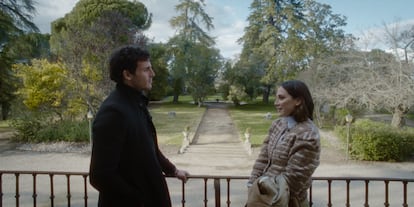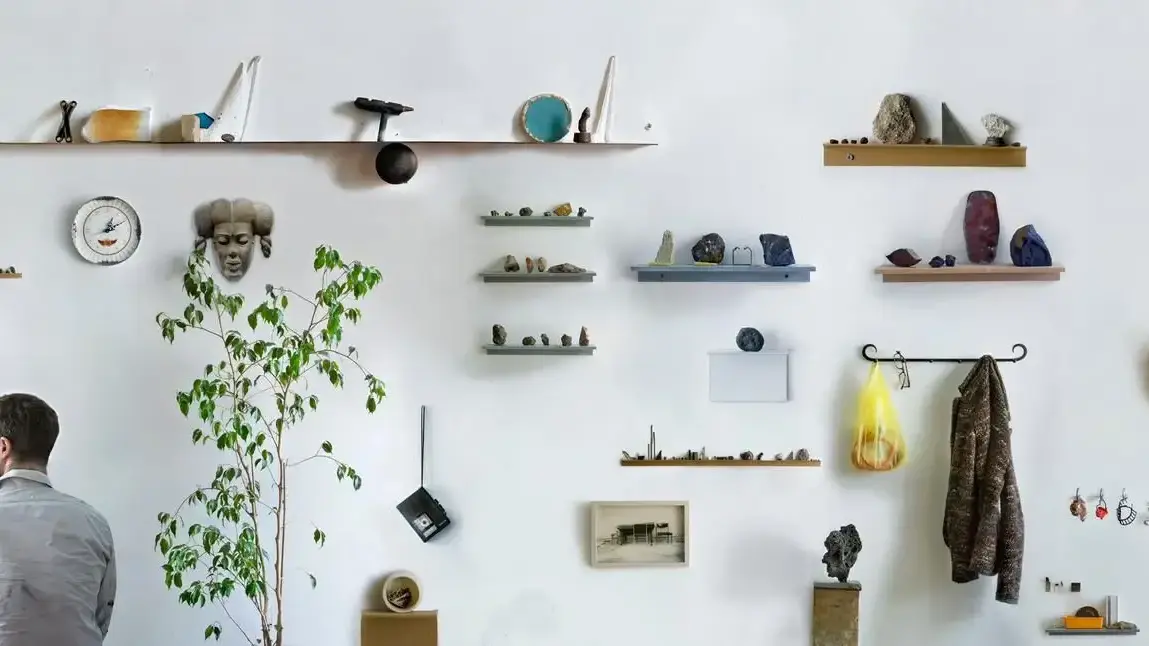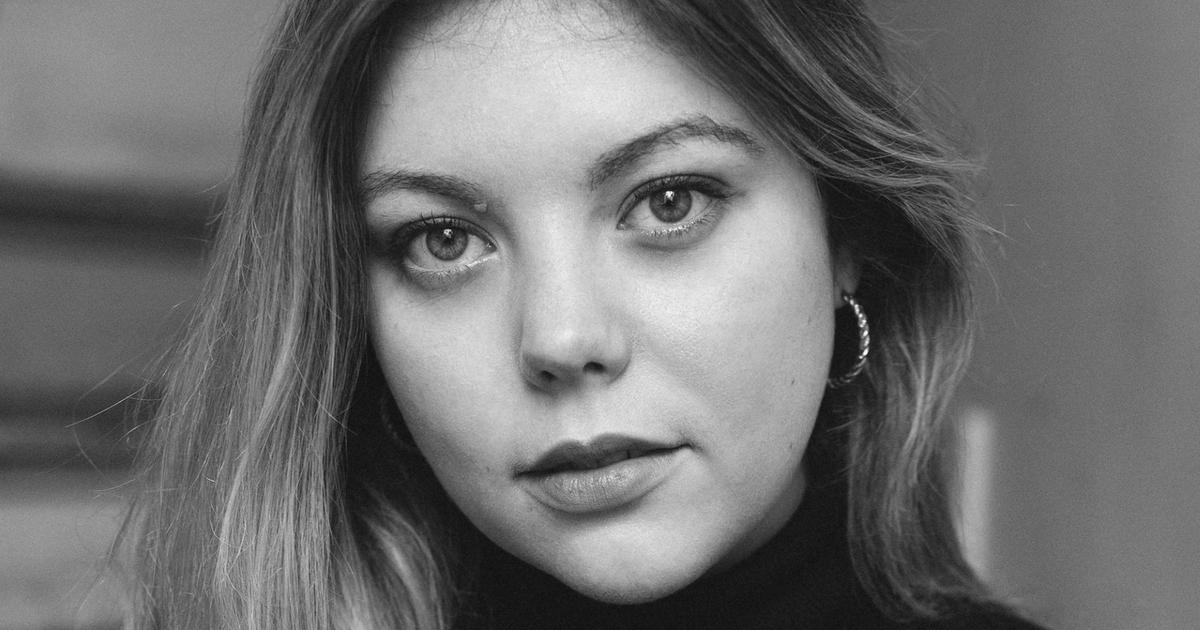The title of the
Netflix
reality show
La Marquesa
could not be more in tune.
Tamara Falcó is a literal aristocrat (her father, Carlos Falcó, bequeathed her the Marquisate of Griñón), is a high-born of the gossip press (she is also heir to Isabel Preysler) and is a nobility of Spanish reality television: she starred in
We Love Tamara
in Cosmo in 2013, he won the fourth edition of
Master Chef Celebrity
in 2019 and now, with
La marquesa
, he has become the first Spanish celebrity to have two
reality shows
of his own.
Tamara Falcó is surrounded by a high school squad that includes a Nobel laureate, an elite tennis player, a haute couture designer and Boris Izaguirre.
There is even a star appearance of the Pope.
But the star of the show is her.
The marquesse.
The
influencer
who cares the least what they think of her.
“I could dedicate my time to more lucrative activities than renovating a castle in the middle of Aldea del Fresno”
Tamara Falcó has a dream.
The narration of
La Marquesa
revolves around the project of opening an ephemeral restaurant in El Rincón, the castle that she inherited from her father.
But Chez Tami does not aspire to be a business but an experience: in the best Preysler tradition, Tamara Falcó knows that the important thing is not what you do but how you do it.
And keeping the restaurant going would never be as exciting as getting it up and running.
Nor, of course, so television.
La Marquesa
is, apart from a
reality show
about the day-to-day life of a celebrity, a
reality show
about cooking and real estate renovation.
A mix between A
Nightmare in the Kitchen
and
Your House on Trial
.
The illusion of Chez Tami is to recreate the glorious past of the castle.
The menu emulates what was served at the wedding of "Aunt Paloma" and "Uncle Pepito" (Paloma Falcó and José Mitjans), the decoration is inspired by the photographs that it preserves from the time and the waiters serve the dishes with pompous choreography to the unison.
"I imagine something like
Downton Abbey
," Falcó fantasizes.
But in
Downton Abbey
the maids had prominence and the actresses who played them even won Emmys.
in
the marquise
There are no social classes because there is only one.
The service is an anonymous mass of men who receive old names like "butler" and who stir the imagination of the audience by wearing gloves like those of Preysler's servant in that Ferrero Rocher ad from the nineties.
Tamara Falcó, at a moment in the documentary series 'La marquesa'.
Chez Tami represents the most real face of
reality television
: Falcó's victory in
Master Chef Celebrity
was not just a celebrity extravaganza, but rather planted a vocation in her.
She obtained the title of chef for Le Cordon Bleu and, far from settling for that goal, established it as a starting signal to continue reaching others.
And Falcó is so clear about his creative vision (“It's ephemeral because you'd love to come back, but it's a dream”) that he doesn't care that most of his relatives consider it a whim.
“As a child I spoke normally and people laughed.
And I didn't understand why."
Tamara Falcó's charisma lies in her contradictions.
The main one of her, being at the same time naive and clueless but perfectly aware of what people see when she looks at her.
Hence, during a photo session she refuses, as nicely as she flatly, to pose drinking from a cup with her pinky outstretched.
Falcó knows that her story is parallel to that of Elle Woods in
Legally Blonde
(2001): the well-informed girl who nobody takes seriously but who knows how to use that condescension to her advantage to demonstrate her worth.
Falcó does not pretend to be taken seriously despite what she is like, but because of it.
Another woman in her place would modulate her childish voice, she would stop referring to her parents as "mommy" and "daddy" or refute those who treat her like a girl.
"Don't talk, just smile," her stylist advises as she poses for the photographers.
Every time Falcó looks at the camera in astonishment in the middle of a conversation, it shows that she has grown up surrounded by people watching her (or that she has seen
The Office)
and her moments of frustration are only visible to the most attentive viewer: when she doesn't like something Falcó is flustered and directs his eyes to an indeterminate point.
Especially every time someone confuses
La Marquesa
, a story of self-improvement, with a romantic comedy.
“Now is not the time to talk about my wedding, it is the time to move this restaurant forward”
Everyone talks about Tamara Falcó's wedding, except Tamara Falcó.
His realistic and pragmatic attitude, undoubtedly inherited from his mother (“I think he is the love of my life”, “If I weren't, I wouldn't be with him, it would be a waste of time”, “Dating is to get to know each other”, “Put the pressure on another person to complete you is dooming them to failure") collides with the image of a girl obsessed with love that all her friends seem to have of her.
Tamara Falcó, with her boyfriend, Íñigo Onieva.
Throughout the six episodes, Falcó comes across people, more or less close to her, who, in the middle of a conversation about their professional projects, bring up the subject of the wedding.
Or they mention her boyfriend, businessman Íñigo Onieva, out of the blue.
Or even ask for a toast to him.
During a photo session, a creative tells him “Where is Íñigo now?
Because he would eat you with that red lip and that leather!”
Even designer Juan Avellaneda, who unapologetically embraces the gay best friend rom-com archetype with exquisite taste in decor, describes Onieva with the words “he's very straight!”
(to which she replies with her snigger: "Thank goodness").
Maybe everyone is telling Falcó what they think she (or, better, a girl like her) wants to hear.
“Instead of wanting to go out at night and have seven drinks, I preferred to stay at home praying the rosary”
Falcó is an anomaly within the so-called “Madrid pijerío”.
In a world that is supposed to be frivolous, empty and unconscious, she is a woman who has embarked on a search for meaning.
Perhaps because she was born into a home where material needs were more than met, her journey to maturity is marked by a yearning to achieve the immaterial.
That is why her restaurant aspires to be "a multisensory experience."
To find these higher meanings, Falcó resorts to the figure of the Virgen de la Alegría, the El Rincon castle and the motorcycle blanket.
The Virgin represents her faith (she also gave her a gift to the Pope: 87 rosaries and a Tous medal designed by her).
The castle represents a connection with her lineage, with her past and with the history of Spain;
that is, with something transcendent that is above her as an individual.
El Rincón is a yearning for eternity and symbolizes an ancestral and immutable way of life.
A life of tapestries, horseback riding and women praying the rosary.
Of kings, marquises and popes.
The tiles in the kitchen at El Rincón are the same as those at La Alhambra.
All of this, so exotic for the average viewer, is Tamara Falcó's nostalgia.
And then there is the motorcycle blanket.
“You know what I don't have?
A blanket"
What do you give to someone who has everything?
Apparently, a blanket for the motorcycle.
One of the
leitmotifs
of
La Marquesa
is Falcó's obstinacy for her boyfriend to give him one of hers.
Onieva reacts with a hesitant and, above all, pragmatic attitude (“But it's not cold anymore”, “But I already gave you some pants”) and she doesn't let go of the bone.
What Falcó wants, as she implies, is that he take the trouble to go to the workshop to order it to be installed.
What she wants, essentially, is for him to protect her from the cold.
And this is a fairly obvious metaphor in a
reality show
that doesn't waste time with double meanings, as Isabel Preysler will be seeing these days.
Isabel Preysler and Tamara Falcó, at a moment in 'La marquesa'.
“My mother is like Santo Tomás, the one who put his finger in the sore spot”
Paloma Rando said in this newspaper that the structure could not be more classic:
La Marquesa
is a lifelong hero's journey.
Well, every hero's journey requires an antagonist (not a villain, mind you) and
La Marquesa
has appointed Isabel Preysler for this role.
“My mother and my whole family think that I am not capable of doing all this,” Falcó tells his chefs to motivate them before the inaugural banquet.
For a good part of the audience, the main curiosity about
La Marquesa
is discovering Isabel Preysler in three dimensions.
Even her daughter resorts to clichés to describe her: “she is one of the most elegant women in Spain”, “she knows what her place is”, “she never knows what she is thinking”.
Presyler's favorite method of expression has always been the cover of
Hello!
and for this reason, although she is one of the most famous women in Spain, there are many spectators who have not heard her talk about her or have never seen her move.
Si
Ninotchka
(1939) was promoted with the catchphrase "Garbo laughs!"
The Marchioness
might as well
have adopted the subtitle "Preysler Speaks!"
And she has things to say.
From the beginning he mistrusted his daughter's project.
"I see it as complicated."
"I just don't understand it very well yet."
"That ephemeral has me very fly."
"Then you can take it to [Madrid's street] Jorge Juan."
In the last episode he serves as a jury and the dramatic climax focuses on his final verdict regarding the ephemeral experience of Chez Tami (and, to a lesser extent, his only interaction with Íñigo Onieva, which consists of a sentence and a half), until give the impression that Tamara Falcó embarked on this project to, in addition to honoring the memory of her father and reconnect with her lineage, achieve the approval of her mother.
Preysler's part is small but the program squeezes her into an omnipotent figure: she appears little on screen but is mentioned so much that she is a constant presence.
In particular, she dominates
in absentia
the climax of
La marquesa
: the almost Almodovarian dialogue between Falcó and the ceramic artist Bárbara Pan.
"How well your mother conceals," observes Barbara.
Yes, because she is Asian.
—I have always been very envious of Asian women, because I am always anguished.
That's why I eat so much.
08:44
Who is who in Tamara Falcó's family?
Ana Boyer, Isabel Preysler, Julio José Iglesias and Tamara Falcó at an event in Oviedo in December 2011. Photo: gtresonline |
Video: EPV
Andy Warhol predicted that in the future art would be famous and celebrity would be an art.
Falcó's talent as an artist consists in intuitively understanding what, for centuries, has fascinated the masses of the aristocracy: the mysterious tension that is generated between what unites them and what separates them.
Yes, Falcó has inherited a castle and travels to New York, Paris and Rome for the renovation process, but in the end he only seeks recognition from his mother and confesses that, if he could choose his last meal, it would be a potato omelette and steaks breaded.
“We had to explain to Mario who Jimmy Choo is”
In a seemingly innocuous scene from
La marquesa
, Falcó and Mario Vargas Llosa walk through a New York bookstore.
Both talk about Flaubert or Twain and, for some reason, it is the only moment in the six chapters in which money figures are mentioned.
They casually talk about old books as "treasures" and "jewels", about the pleasure of reading and about the possibilities of knowledge.
The story of Falcó learning to read with the bodyguards of "Tito Miguel" (Boyer, when he was Minister of Finance) is particularly endearing.
It is likely that in the entire Netflix catalog there is not a single scene with as many books as this one.
In
La marquesa,
Vargas Llosa explains that
Ulysses
by James Joyce "comes out the whole modern novel" and says that he began writing after seeing as a child "a work that did not respect time or space"
(Death of a salesman
by Arthur Miller ).
The Nobel laureates on the human and the divine with the simplicity of the most complex thinkers: an anecdotal conversation about how terrified he is of nuggets (and how Preysler made the mistake of offering him olives on their first date) leads to a reflection on how some Traumas should not be resolved because they are the mystery that makes us human.
"And they are perfect for a writer," he concludes.
There was a time when intellectuals were a regular presence on Spanish television.
Names like Umbral, Gala, Labordeta, Cela or Bueno.
But it's hard to imagine a show on the current grid that accommodated those kinds of cultural mentors.
Years ago an instant like this would happen, for example, in
Con las manos en la masa
.
Today it happens in
La Marquesa
.
You can follow ICON on
,
,
, or subscribe to the
Newsletter here
.








/cloudfront-eu-central-1.images.arcpublishing.com/prisa/V3OC5EYQQZGJZP7PIPZWHG3WDM.jpg)
/cloudfront-eu-central-1.images.arcpublishing.com/prisa/N5I3RF3TDYZQTGLV6XWP6ZXDLM.jpg)